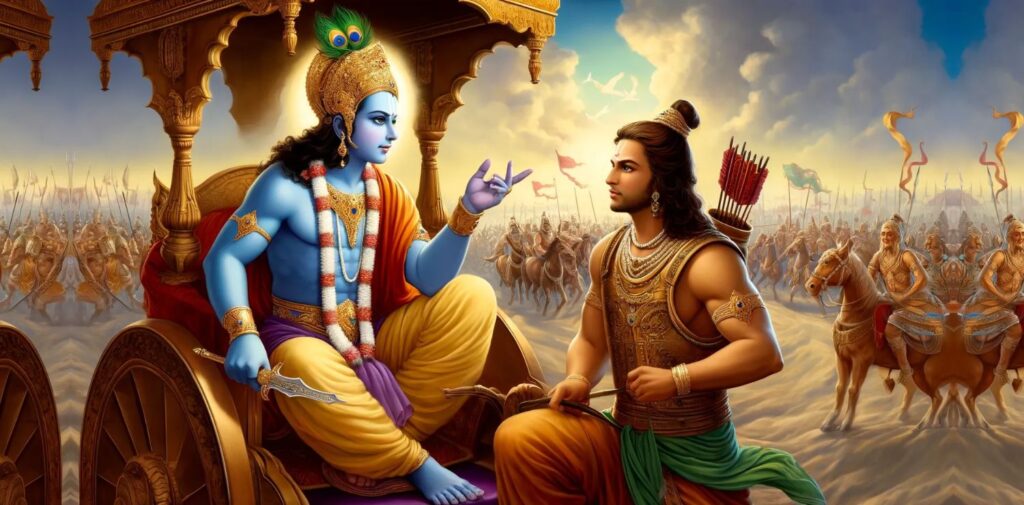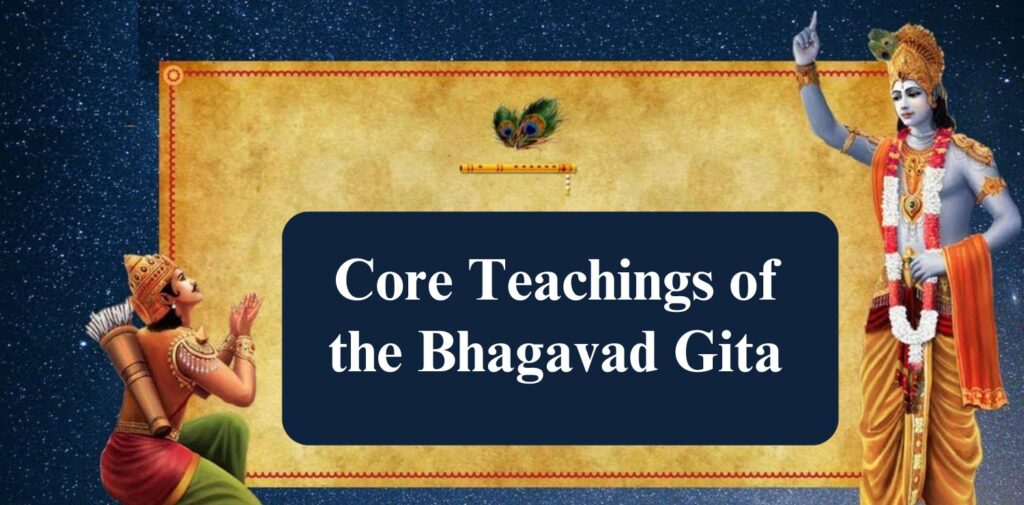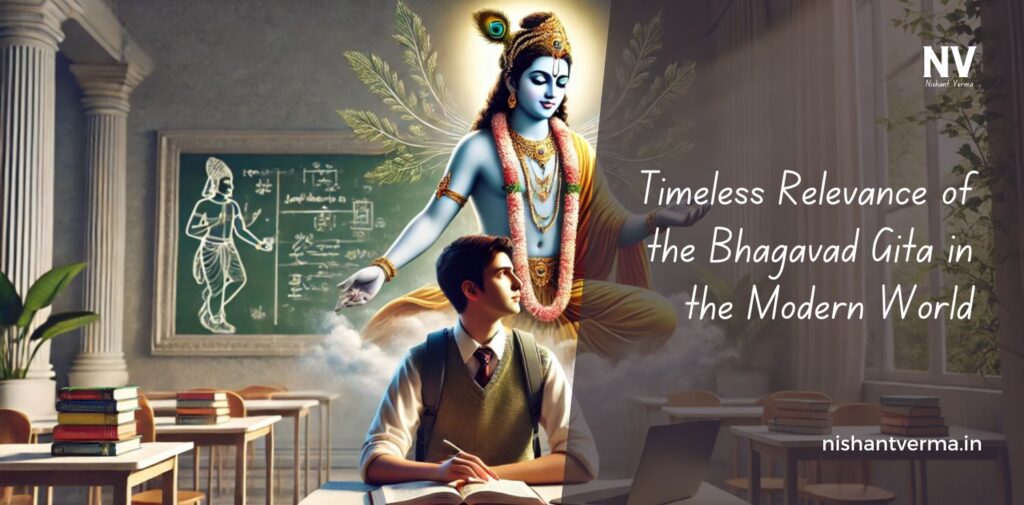The Bhagavad Gita, often referred to simply as the Gita, is one of the most revered and influential texts in the world. It is part of the Indian epic Mahabharata and consists of 700 verses that are a conversation between Prince Arjuna and Lord Krishna, who serves as his charioteer. In this conversation, Lord Krishna imparts profound spiritual wisdom to Arjuna, who is confused and filled with moral dilemmas about his duty in the battlefield of Kurukshetra.
Though the Bhagavad Gita was written thousands of years ago, its teachings have timeless relevance and continue to inspire people across the world. In today’s fast-paced, stress-filled, and often confusing world, the Gita offers valuable insights that help us navigate the challenges of life with clarity, purpose, and peace.

What is the Bhagavad Gita?
The Bhagavad Gita is a sacred Hindu scripture, part of the Mahabharata, one of the longest epics in world literature. The Gita takes place in the form of a dialogue between Arjuna, a warrior prince, and Krishna, who is his guide and friend. The conversation occurs on the battlefield just before a great war is about to begin, where Arjuna is filled with doubts about fighting in the war and killing his relatives and friends who are on the opposite side. He is torn between his duties as a warrior and his moral concern for the lives of those he loves.
At this moment of moral confusion, Lord Krishna imparts timeless wisdom, addressing Arjuna’s dilemmas with teachings on duty (dharma), the nature of life and death, the importance of selfless action, and the path to spiritual liberation. These teachings are not limited to any one religion or culture but offer universal guidance on how to live a righteous and fulfilling life.

Core Teachings of the Bhagavad Gita
To understand the relevance of the Bhagavad Gita today, it’s essential to explore its core teachings. The Gita’s wisdom applies to people from all walks of life and provides guidance on how to deal with the difficulties, conflicts, and questions that arise in life.
Importance of Dharma (Righteous Duty)
One of the central teachings of the Bhagavad Gita is the concept of dharma, which refers to the right course of action or duty. Arjuna’s confusion arises because he feels that participating in the war would be wrong, as it involves fighting against his relatives and teachers. Krishna explains to him that one must act according to their dharma, which in Arjuna’s case is to fight as a warrior. Dharma is not just about following societal rules but understanding one’s purpose and acting in accordance with one’s nature and role in life.
In the modern world, many people face dilemmas about what is the right thing to do in complex situations, whether at work, in relationships, or in personal matters. The Gita teaches that we must understand our responsibilities and duties, and act with integrity, even if the path is difficult. Knowing what is right and doing it, despite personal discomfort, leads to inner peace and fulfillment.
Selfless Action (Karma Yoga)
Another profound teaching of the Bhagavad Gita is the importance of selfless action or Karma Yoga. Krishna advises Arjuna to perform his duty without attachment to the results. He teaches that one should not be attached to the fruits of their actions—whether success or failure—but should focus purely on doing their duty with sincerity and dedication.
This teaching is especially relevant in today’s competitive world, where people often measure their worth based on their achievements and the outcomes of their efforts. The pressure to succeed, win, or achieve can create anxiety and frustration. The Gita encourages people to focus on doing their best in whatever they do, without worrying too much about the results. This approach reduces stress and helps people find joy in the process of work itself, rather than waiting for external validation or rewards.
Detachment and Inner Peace
Krishna also talks about the importance of detachment—being inwardly free from desires and attachments. While this does not mean renouncing the world or withdrawing from one’s responsibilities, it teaches the importance of not becoming overly attached to the things or people in our lives. Attachment to material things, success, or even relationships can lead to suffering when those things are lost or change.
In the modern world, where consumerism, social media, and societal expectations often push people to seek constant validation or possessions, this teaching of detachment is incredibly valuable. It helps individuals focus on what truly matters—inner peace, self-growth, and spiritual well-being—rather than getting caught up in external desires or comparing themselves to others.
The Nature of the Self (Atman)
One of the most profound teachings of the Gita is the nature of the self, or Atman. Krishna tells Arjuna that the true self is eternal and indestructible. The physical body may age, decay, and die, but the soul (or Atman) is immortal. Understanding that we are not our bodies or external identities but are instead eternal souls helps us face life’s challenges with greater wisdom and equanimity.
In today’s world, where people often tie their sense of self-worth to their appearance, achievements, or social status, this teaching of the eternal nature of the self can provide a sense of relief. Realizing that we are more than just our temporary circumstances can bring a sense of inner freedom and peace.
Meditation and Mindfulness (Dhyana Yoga)
The Gita also emphasizes the importance of meditation and controlling the mind. Krishna advises Arjuna to practice meditation (Dhyana Yoga) to attain self-realization and spiritual clarity. The practice of meditation helps calm the mind, reduce stress, and connect with one’s deeper sense of purpose.
In today’s fast-paced world, where anxiety and mental stress are common, the practice of mindfulness and meditation is increasingly recognized as essential for mental well-being. Whether through formal meditation practices or simply learning to be more present in daily life, the teachings of the Gita offer a way to find peace amidst the chaos of modern living.

The Bhagavad Gita and Modern Life
The Bhagavad Gita speaks to us not just as a religious or spiritual text, but as a manual for living a meaningful and peaceful life. The dilemmas Arjuna faced in the Gita—moral confusion, fear of failure, the weight of duty—are struggles that every human being faces at some point in life. Whether in the workplace, in relationships, or in personal growth, we all experience moments of doubt, stress, and uncertainty.
The wisdom of the Gita provides timeless answers to these challenges:
- It teaches us how to face life’s struggles with courage: Just as Arjuna had to confront his fears and uncertainties, we too are called to confront the challenges that arise in our lives. Krishna’s guidance helps us navigate these challenges with a calm and focused mind.
- It helps us understand our responsibilities: The Gita teaches that our duties and responsibilities are important, and we must take them seriously, even when the path seems difficult. By understanding our roles in the world and acting in accordance with them, we can find deeper meaning in our lives.
- It encourages us to live with integrity and compassion: Selfless action and devotion to the greater good are core principles of the Gita. In a world that often seems focused on individual success, the Gita reminds us to work for the benefit of all.
- It teaches the value of inner peace: By focusing on meditation, detachment, and understanding the nature of the self, the Gita offers a pathway to inner peace and fulfillment, regardless of external circumstances.
Conclusion
The Bhagavad Gita is not just an ancient scripture but a timeless guide for living a righteous, fulfilling, and peaceful life. Its teachings on duty, selfless action, detachment, meditation, and understanding the true nature of the self continue to offer wisdom that is deeply relevant in the modern world. Whether you’re facing personal challenges, striving for success, or seeking deeper meaning, the Gita provides practical and spiritual tools to navigate the complexities of life with greater clarity and peace.
In a world filled with distractions, pressures, and uncertainty, the Bhagavad Gita reminds us of our higher purpose and the importance of living a life aligned with our values and inner truth. It is, indeed, a timeless guide to overcoming life’s challenges and finding lasting happiness and peace.




